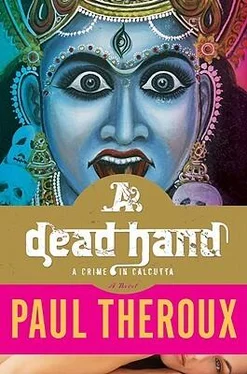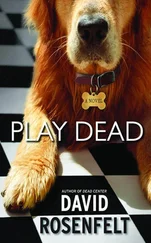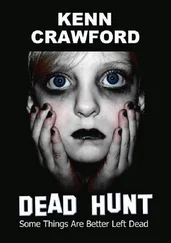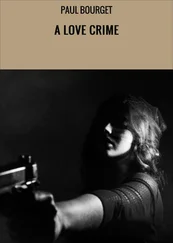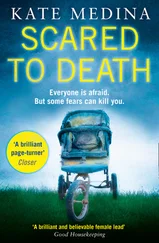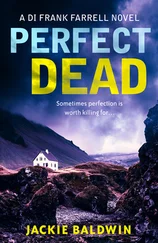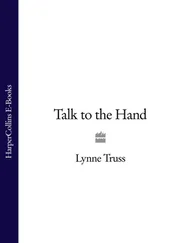"I lost something."
"I am having a brace of complaints about you — giving a nuisance in the night. You are making me headaches. I can charge-sheet you!"
"I was looking for something."
All this time I was backing away from Mr. Biswas, half enjoying his fury, half fearing it. I wanted to hit him.
"Look somewhere else. Do not look here. You are creating intrusion."
"Okay," I said, and sidled toward my room.
"You must leave," he said. He was screechy and agitated in his loose dhoti, his hair mussed. I guessed that he had just woken up.
"I can't leave."
"Immediately. Take your things and go. Get out."
But I was at my door now. He had startled me at first, but now I was able to compose myself a little.
"I must eject you."
"It's only six-thirty."
"You must go, sir," he said, clamping his mouth shut, though there was a froth of reddened spittle at his lips.
"I paid for breakfast. I'll leave after breakfast."
"I will refund you twenty rupees. You will take breakfast elsewhere."
"I will have breakfast here."
"Then you will take breakfast now, without delay."
This snorting vituperative man, with his fangy face, in his puffy skirts, alarmed me, but also made me think that I was on the trail of this mystery. He was just the sort of bully who'd abet a murder or a disappearance — a sour face, a mean and heartless manner. He had manhandled Mina. He snapped his fingers at Chitra and muttered something in Bengali.
"You will take something to eat. Then you will vacate."
He turned and, holding his dhoti, a bunch of gauze in his fist, a skinny aunt in a frenzy, he descended the stairs, his sandals slapping.
"May I bring tea, sir?" Chitra said.
"Good idea. And a roti."
I lay on my rumpled bed, my heart pounding. The fuss with the manager had unsettled me, because it had been so sudden and because he seemed such a brute. I was out of breath, damp from the heat, trying to imagine Rajat here — the dead boy on the floor, the unrolled carpet. I felt mocked by my helplessness, ashamed of having come here in the absurd presumption that I might be able to puzzle out the mystery. I had found nothing.
But why linger? I was hot and weary from the early-morning confrontation. I took a quick shower — a cold piddle from a rusty pipe — dried myself on the small towel that was as thin as a dishcloth, put on clean trousers and a fresh shirt, folded my pajama bottoms, and stuffed them into my shoulder bag. Bunching my other cargo pants, I felt a bulge. So I emptied the pockets of the grubby rupees, the insubstantial coins, the receipt the manager had given me the evening before, my wallet, my passport, the fraying piece of carpet.
In my amateurish way, looking literally, I'd thought that I might see a carpet at the Ananda with a chunk taken out of it — this chunk a piece of the puzzle. But the carpet in this room, like the carpet in every room I'd seen at the hotel, was gray and dirty. I was a fool, pretending to be a detective.
A knock—"Tea, sir" — and Chitra entered carrying a tray, a pot of tea, a cup, a dish of sugar, a pitcher of milk, a spoon, and a plate of cookies.
"What's that?"
"Milk Bikki, sir. Dry biscuit." She lifted and shook the plate of cookies. "No roti available."
I scraped the piece of carpet out of her way as she lowered the tray to the small table. She faltered, tipping the load, the cup and tea things slipping to the tray's edge and almost toppling. She had looked aside at the square of carpet and whinnied in fear and recognition.
"You know what this is?"
"Mina, sir." She was whispering, retrieving a fallen spoon from the floor.
"Where did she get it?"
"I cut for Mina."
"Where did you cut it? Where did you find it?"
She took a breath. She widened her eyes. She said, "I find everywhere."
I smiled at her reply. "Show me."
She stepped to the door, which she'd left open, and glanced into the hall. Seeing no one, she went to one of the rooms I'd seen her clean and opened the clothes closet. And there on the floor of the closet, cut to fill the space, was a red carpet, identical in color to the square I had, with a yellow loop of the floral design.
I stooped to look at it, but she was paddling the air, beckoning me to a new room. This one too had a carpet in the closet, a large rectangle, obviously part of the same larger carpet.
"All wardrobe, sir."
Two more rooms had similar pieces of the carpet on the floor of the closets. I examined them all quietly and quickly, realizing that I'd made a connection. One of the pieces was seriously stained, brownish; something had seeped into the weave. I removed it and rolled it up and put it into my bag.
"I will thank you not to come back," Mr. Biswas said in the lobby, glaring at me, his hairy ears twitching.
But I smiled. I was happy. I had what I wanted, and had not even realized that it was what I'd been looking for.
"You are not welcome, mister, at this premises."
I waited at a coffee shop near the Hogg Market until nine, then called Howard at the consulate and asked him to meet me for lunch. "Still here!" he said. "I thought we'd got rid of you."
Over noodles and spring rolls at the New Cathay on Chowringhee, I told him I was growing to like Calcutta.
"I'm glad. At first glance it's a horror, but it grows on you. It's a little limiting for a single guy, though. I can't get a date without a chaperone. I've invited my ex-wife back, just to have someone to go to a movie with. How are you making out?"
"I'm doing a favor for a friend."
He stopped eating and said, "In India, 'friend' always means woman."
"It's not Parvati."
"Too bad. She always asks after you."
"She's too good for me."
Howard said, "You always call when you need something. What do you need?"
"I'm sorry."
"I'm just teasing you."
"But I do need something."
"I want to help. With you, I always feel as if I'll end up in a story. That's nice. It'll give me credibility."
"Remember that guy at police headquarters, Dr. Mukherjee? The forensics man. I want to see him again, but I need you to tell him that I'm honest. I've already aroused his suspicions with one piece of evidence."
"I'll vouch for you. I see him all the time. Americans are constantly dying in India, usually old ones, of heart failure. But sometimes young ones in suspicious circumstances. We get Dr. Mukherjee to run the tests and sign the death certificates."
"You'll assure him that I can be trusted?"
"I'll remind him that you're one of us."
"That's really good of you."
"You're an American. You've got a problem. I'm a consular officer. This is my job. Besides, it's too hot to go back to the office."
In the taxi, Howard said casually, "Does this have anything to do with Mrs. Unger?"
"Why do you ask?"
"You mentioned her once a while back," he said. I didn't say anything, so he went on. "Which is odd. I mean, the only other person who asked about her was Paul Theroux. But when we met you at the Fairlawn you said you didn't know her."
"Did you believe me?"
"Yes, but Paul didn't."
"Did that guy really leave? I don't trust him."
"He said he wanted to take the train from Battambang to Phnom Penh."
"He would. The bus is quicker!"
Perhaps hoping to calm me, Howard said, "Mrs. Unger has no profile in Calcutta. She's never in the news. And yet she's here all the time."
"She doesn't like publicity."
"How do you know?"
He was very shrewd, but then, he'd lived in Calcutta for three years. In the nicest way, he'd caught me. I said, "She told me."
He nodded, and though his expression was mild, I could see his eyes in a rapid calculation.
"She's an amazing woman, an incredible philanthropist," I said, but I felt helpless saying this. There was no way I could adequately describe what Mrs. Unger meant to me, and it seemed disloyal merely to mention her name like this. "I respect her privacy. Theroux just wanted to use her."
Читать дальше
